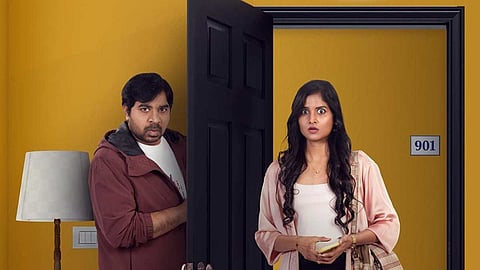My Dear Donga Movie Review: A character-driven comedy-drama that is endearing and dry in equal measures
My Dear Donga(2.5 / 5)
Films centred around underdog protagonists are not uncommon. Just a few weeks ago, we revelled in the stumbling attempts of Sachin in Premalu, as he struggled to find love and a direction in life. More often than not, these characters have something going for them. They come with quirks that set them apart. The more imperfect they are, the more interesting their journey becomes.
Director: B S Sarwagna Kumar
Cast: Abhinav Gomatam, Shalini Kondepudi, Divya Sripada, Nikhil Gajula, Sashaank Manduri
Streamer: AHA
Sujatha (Shalini Kondepudi), the protagonist of My Dear Donga, does not belong to that club. She is just… a regular young woman. She has nearly made peace with playing second fiddle in her own life, despite her penchant for breaking the fourth wall regularly with her inner monologues. Her ordinariness stands out more so because, for a large portion of the first half, we see her play second fiddle in other people’s lives as well. That gaze is undeniably palpable in the film's early scenes, like when her best friend Bujji (Divya Sripada) gets a proposal or when Sujatha catches her boyfriend Vishal lying to her. It’s only when we see Sujatha seated in front of a television, getting all emotional in the privacy of her home, hearing a song from a Mani Ratnam movie, that we first see her in her own world, being her true self. Amidst all the well-timed humour, the pathos of Sujatha rings true, and Shalini Kondepudi sells us the portrayal of this plain Jane prototype, who has nothing going for her.
So when Sujatha, an emotionally anxious copywriter, gets a uniquely surprising visit on her birthday eve—from a small-time thief named Suresh (Abhinav Gomatam), big changes in her life follow as he ends up becoming an integral component of her life.
Little vignettes of conversational humour keep My Dear Donga on its toes. In an outrageous moment, as Sujatha and Suresh bond over their similar past of dealing with a distant father figure, the talk ascends to a point where they begin to wonder if their father is indeed the same person. As they utter different names at once, Suresh breathes a sigh of relief. The tragedy instantly defuses into comedy, as they realise they too have something to be grateful for, despite nursing such wounded pasts.
Despite these moments and many scenes with madcap energy, it takes you little time to manoeuvre a film like My Dear Donga, which is not the sitcom it promised to be, but instead a tender coming-of-age story, where our protagonist Sujatha finally becomes the main character of her own life after an absurdly chance encounter with a stranger. The unfortunate part is that the film fails to find a sweet spot between its humour and poignance.
My Dear Donga surprises us by not going for a conventionally affirmative ending when we know where things are headed. It’s a brave choice to wrap up the narrative the way Shalini does here. The scenes get easier on the laughs and focuses more on emotional resolutions when it’s time for Sujatha to find a little steadiness in her life. The humour takes a backseat, both for Sujatha and the viewers. We just know Sujatha is a different person now, and we can only be grateful for it. But again, a switch between humour and warmth is not an easy one, and My Dear Donga constantly tumbles as it tries to hit the right note. We find ourselves in conflict on whether to surrender to the film’s gentleness or be put off by its rickety staging. The breaking of the fourth wall is interesting, but it gets jaded after a point.
Shalini Kondepudi (who has also written the film) gives her everything to make this film work, but her efforts are undone by other departments that don’t rise to the occasion. My Dear Donga needed a better director. There are many jokes that do land well, but there are also an equal number of moments that pass us by without a chuckle. Also, it’s not often that a film’s low production scale bothers me, but My Dear Donga’s distant two shots and underlit frames really stuck in the craw. I was particularly bewildered by Sujatha’s darkly lit face in a crucial confrontational scene in the final act. How can it be easy to emotionally invest in a narrative when we find ourselves trying to see the protagonist’s face? (Credit goes here to Shalini, who keeps us invested nonetheless with her raw yet earnest portrayal of Sujatha.)
When director B S Sarwagna Kumar is not impeded by his technical limitations or his struggles to find the right tonality, he keeps up with the script’s ambitions, capturing the mundane awkwardness of real-life relationships. Bujji, Varun, and Vishal—the people who occupy space in Sujatha’s life—are not on-your-nose comic relief figures. They carry an ordinariness just enough to have our empathy, with a touch of self-delusion that makes them funny. When Sujatha and her friends casually begin to dance at a house party, it has no artifice. There is no zealous attempt by anyone to bring the house down. Everyone dances with a unique energy, and it is the incongruity of this energy that resonates. At another point, two newly-formed friends awkwardly talk about the day’s weather, soon pondering about the temperature the day before, turning too analytical for their own good. It’s embarrassing to others around them, but a sweet bonding moment for the two, and the director deftly captures the tenderness of the moment, without losing out on the humour.
It’s these moments of laidback charm where My Dear Donga shines the brightest. And while there is a lot to complain about here, there is also enough warmth that makes it hard to dismiss My Dear Donga in its entirety.

